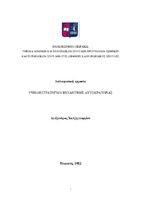Υψηλή στρατηγική Βυζαντινής Αυτοκρατορίας

View/
Keywords
Υψηλή στρατηγική ; Βυζαντινή ΑυτοκρατορίαAbstract
This thesis examines the grand strategy of the Byzantine Empire, focusing on the unique combination of military innovation, diplomatic acumen, and strategic adaptability that enabled the empire to endure for over a millennium. By exploring the evolution of Byzantine strategy from its inception in the divided Roman Empire to its peak as a formidable medieval power, this study highlights how the Byzantines managed to navigate a complex geopolitical landscape.
Chapter 1 provides an introduction and defines key concepts related to Byzantine strategy. Chapter 2 discusses the foundational aspects of Byzantine military strategy, emphasizing the integration of the theme system, the professionalization of the army, and the significance of technological innovations such as Greek fire and the Walls of Constantinople. Chapter 3 focuses on the emergence of new strategies in response to evolving threats, including the strategic use of diplomacy, intelligence, and espionage to counter challenges posed by formidable adversaries like the Huns and other steppe nomads. Chapter 4 explores Byzantine diplomacy in greater detail, analyzing the use of envoys and religious influence to forge alliances and expand the Orthodox Christian sphere. The thesis underscores the importance of religious diplomacy, particularly in relations with emerging powers such as Kievan Rus’, and highlights the role of the Byzantine Church in fostering cultural ties and securing political alliances.
The conclusions drawn from this study reveal that the Byzantine Empire's grand strategy was characterized by its adaptability and resilience. The Byzantines successfully balanced military strength with diplomatic finesse, leveraging their strategic advantages to mitigate their limitations. This multifaceted approach allowed them to maintain their sovereignty and influence in an ever-changing world, leaving a lasting legacy on subsequent empires and modern strategic thought.
Overall, this thesis demonstrates that the grand strategy of the Byzantine Empire was a dynamic and complex endeavor, integrating military, diplomatic, and religious elements to create a cohesive and effective framework for enduring power. The lessons learned from Byzantine strategy continue to offer valuable insights into the art of statecraft and the challenges of international relations.


